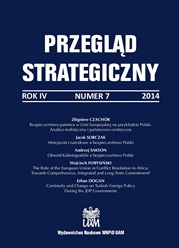The Iranian Foreign Policyin the Persian Gulf Region under the Rule of President Hassan Rouhani: Continuity of Change
The Iranian Foreign Policyin the Persian Gulf Region under the Rule of President Hassan Rouhani: Continuity of Change
Author(s): Przemysław OsiewiczSubject(s): Politics / Political Sciences
Published by: Uniwersytet Adama Mickiewicza
Keywords: Iran; Persian Gulf; President Rouhani
Summary/Abstract: Although Iran borders with many states and has direct access to the Caspian Sea as well as the Indian Ocean, the Persian Gulf region seems to be the most vital area to its security and prosperity. Yet since the 70’s Iran’s relations with the Arab states in the region have been rather strained and complex. The main reason for that had been the success of the Islamic revolution in 1979 which later resulted in a new dimension of Sunni-Shia rivalry. Moreover, post-revolutionary Iranian authorities also intended to maintain the regional hegemony from the Imperial State of Iran period. As a result, successive Iranian governments competed for hegemony in the Persian Gulf with the littoral Arab states which consolidated their regional positions due to close links and intensive cooperation with the West especially with the United States. Despite some political and economic initiatives which were undertaken by President Mahmoud Ahmadinejad, this rivalry was also evident between 2005–2013. The main aim of this article is to find out whether Iranian foreign policy towards the Arab states in the Persian Gulf region has undergone any significant changes since Hassan Rouhani became the President of the Islamic Republic of Iran in August 2013. According to Mohammad Reza Deshiri, the Iranian foreign policy after 1979 can be divided into so-called waves of idealism and realism. During dominance of idealism values and spirituality are more important than pragmatism while during the realistic waves political as well as economic interests prevail over spirituality. Iranian idealism is connected with export of revolutionary ideas, Shia dominance as well as the restoration of unity among all muslims (ummah). On this basis both presidential terms of Mahmoud Ahmadinejad can be classified as ‘waves of idealism’, albeit some of his ideas were very pragmatic. The question is if Hassan Rouhani’s foreign policy represents a continuity or a change. Is the current Iran’s foreign policy towards the Persian Gulf region idealistic or rather realistic? The main assumption is that there will be no Arab-Iranian rapprochement in the Persian Gulf without a prior normalization of political relations between Iran and the West especially the United States.
Journal: Przegląd Strategiczny
- Issue Year: IV/2014
- Issue No: 7
- Page Range: 249-262
- Page Count: 14
- Language: Polish

